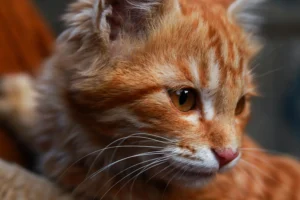As a cat owner, you’re no stranger to the special connection you share with your feline friend. You’ve experienced the joy of having them curl up in your lap, the comfort of their soft purrs, and the entertainment of their playful antics.
But have you ever wondered if your cat can sense when you’re not feeling well?
Cats: The Ultimate Empathizers
Cats are known for their independence, but they’re also incredibly perceptive animals. They can pick up on subtle changes in their environment and the people around them.
Research suggests that cats can detect changes in their owner’s behavior, mood, and even physical health. But how do they do it?
Body Language and Behavioral Cues
Cats are masters at reading body language. They can detect subtle changes in your posture, facial expressions, and even the way you move.
When you’re feeling under the weather, you may be more sluggish, irritable, or withdrawn – all cues that your cat can pick up on. They may also notice changes in your daily routine, such as sleeping more or eating less, which can indicate that something’s off.
The Power of Scent
Cats have an incredibly developed sense of smell, which they use to navigate their environment and detect pheromones.
When you’re sick, your body chemistry changes, and your scent may be affected. Cats can detect these changes and may be able to tell when you’re not feeling well.
Do Cats Show Empathy?
While we can’t know for certain what our cats are thinking, their behavior suggests that they do show empathy towards their owners.
When you’re feeling unwell, your cat may become more affectionate, clingy, or attentive. They may even try to comfort you by nuzzling, purring, or curling up beside you.
Real-Life Examples
Many cat owners have reported instances where their cat seemed to sense that they were feeling unwell. Some examples include:
- A cat that refused to leave their owner’s side when they were bedridden with the flu
- A cat that became more affectionate and playful when their owner was going through a stressful time
- A cat that seemed to detect when their owner was experiencing a panic attack and would try to calm them down
Can Cats Help with Health Issues?
While cats can’t diagnose or treat medical conditions, they can certainly provide emotional support and comfort. In fact, therapy cats are often used in hospitals, nursing homes, and mental health facilities to provide comfort and companionship to patients.
Conclusion
The bond between cats and their owners is truly special, and it’s clear that cats can sense when we’re not feeling well. By paying attention to their behavior and body language, we can better understand what they’re trying to tell us. So next time your cat curls up beside you when you’re feeling under the weather, know that they’re trying to show you love, comfort, and support.
Frequently Asked Questions
Can cats detect specific health conditions?
While cats can’t diagnose medical conditions, they may be able to detect changes in their owner’s behavior or body language that could indicate a underlying health issue.
How can I tell if my cat is trying to comfort me?
Pay attention to changes in your cat’s behavior, such as increased affection, clinginess, or attention-seeking. They may also try to comfort you by nuzzling, purring, or curling up beside you.
Can cats help with mental health issues?
Yes, cats can provide emotional support and comfort, which can be especially helpful for people dealing with mental health issues such as anxiety, depression, or PTSD.
I hope you enjoyed this article! If you have any more questions or topics you’d like to explore, feel free to ask!

